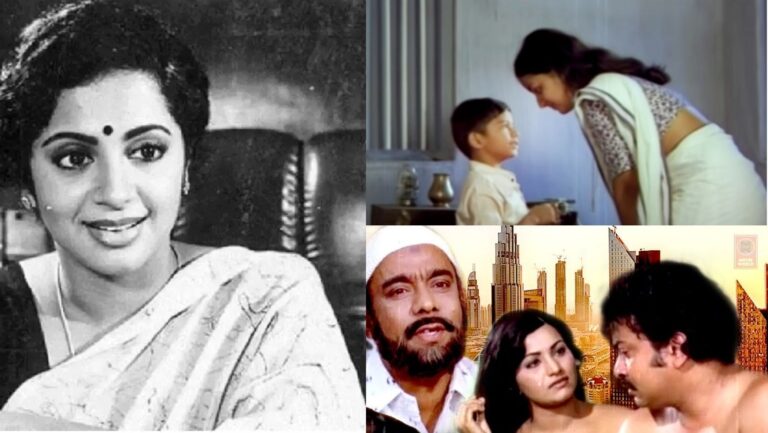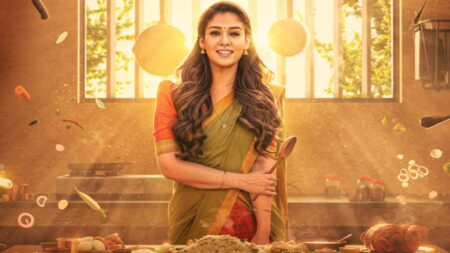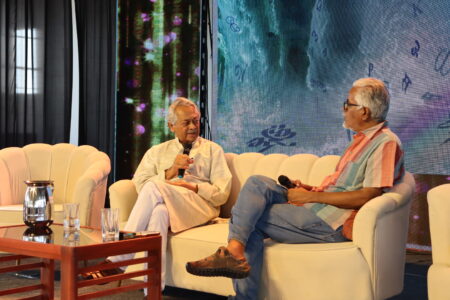MT: Malayalam’s Talisman part 5. A series that highlights what is commonly considered to be one of the lesser achievements of legendary writer and filmmaker MT Vasudevan Nair – his screenplays. On the menu this time are the films, Edavazhiyile Poocha, Minda Poocha, Vilkkanundu Swapnangal and Oppol.
Film: Edavazhiyile Poocha, Minda Poocha (Alley Cat Silent Cat) (1979)
Cast: Srividya, Madhu, Soman, Ambika, Sankaradi
Director: Hariharan
I remember an interview with the great Adoor Gopalakrishnan where he was replying to a question about why he always wrote the screenplay for his films and never directed another writer’s screenplay. He said he was not as talented as those other directors who could come to the set and start shooting. Tongue firmly in the left cheek, I am sure!
Other than some incredibly talented auteurs, most directors work off others’ scripts. Sometimes, the partnership is so fluid and the result so outstanding that you find it hard to believe they were two people. When one thinks of MT as a writer of screenplays, the first name to come to mind as a director might be Hariharan. A director who always seemed to know the pulse of the audience, Hariharan effortlessly married populist elements with sound filmmaking techniques and gave a lot of credit to the intelligence of his audience.
If you were to remove 11 movies from his filmography of over 50, you will get a great body of work, with a few films such as Sharapanjaram (catapulting Jayan to the title of Malayalam’s first action superstar) and Sargam (a beloved musical) standing out. If you were to add those 11 (plus one that was never released), then you will be awed by an extraordinary legacy. MT’s layered screenplays gave Hariharan the opportunity to bring his top game. In return, Hariharan was able to translate those scripts to the screen better than almost any other director.
The duo did not set the world on fire with their first collaboration. Edavazhiyile Poocha was a tame affair compared to the masterpieces that would follow. It is a marital drama that often struggles to find the exact tone it wants to take. Most of the story is told in flashbacks that are linear, but not continuous.
Raja (Madhu), a high-ranking Civil Servant, is getting ready for the marriage of his only daughter Shyamala (Ambika). On the eve of the wedding, he gets a call that he had been dreading. Who was it and why was Raja panicking? We go back in time to meet college lecturer Rohini (Srividya) who has an arranged marriage with Raja. We find out bits and pieces of their lives through flashbacks. A friend from Raja’s younger days, Bhagyanath (Soman), enters their life and turns it upside down.
Madhu plays the pompous and pretentious Raja without any restraint. He is the aggrieved party here, but no one sympathises with him. Soman’s Bhagyanath, on the other hand, is much more complex. He may be a chauvinist, but with enough other qualities that it is not unbelievable that women may fall for him. Sankaradi plays the servile man Friday who can see no wrong in his master. A role that can make today’s audience squirm a bit.
Ultimately, this is Srividya’s movie. And that is also Edavazhiyile Poocha’s biggest plus. It unabashedly takes the side of the flawed, yet real Rohini. The motivations for her actions do not always make sense, but they are her own. Srividya is a unique actress in Malayalam. She never had the figure to be the traditional heroine. This meant that, more often than not, she would be paired with much older actors. Hers was not the traditional beauty, but she had the most expressive eyes in the industry. This was among her most lauded roles.
There are some really great Malayalam films that showcase a flawed heroine. Edavazhiyile Poocha doesn’t reach those heights. A truly regressive ending does not help. But the journey to that point is watchable. There are very evident signs that this is not a run-of-the-mill drama. But there are equal occasions which frustrate. Care is taken to elaborately showcase the early days of the marriage. But it seems like time ran out and the latter part of the film seems incomplete.
The opening batsmen in a Test match spend a lot of time in the middle getting used to the conditions before dominating. Edavazhiyile Poocha Minda Poocha is the first half hour in the match. This will be a long and unbeaten partnership. But the highlights reel may not include effort. But still, welcome, Mr Hariharan. This series has been waiting for your entrance.
Film: Vilkkanundu Swapnangal (Dreams for Sale, 1980)
Cast: Sukumaran, Srividya, Jalaja, Sreelatha Namboothiri, Bahadoor, Mammooty, Sreenivasan
Director: M Azad
The Gulf. No other stretch of foreign land has captured the Keralite’s fascination like the Gulf. The term is used to collectively identify the countries bordering the Persian Gulf. They are Bahrain, Kuwait, Iraq, Oman, Qatar, Saudi Arabia and UAE. In the 70s as the oil boom happened in the Middle East, the Gulf became an attractive employment destination for Keralites. Once the Iran-Iraq war started, the latter lost its lustre. But, to this day, the migration to the Gulf continues.
A lot of those travelling would end up working menial tasks and living in crowded labour camps. But the favourable exchange rate meant that whenever they came back for a visit, which was probably once a couple of years, they could afford to pass on the illusion they were very successful. They were, too, in comparison to their friends who stayed behind. Life was tough in the Gulf, but with no one to pass judgement on what kind of job they were doing, these travellers bettered the living conditions of their families behind. The Gulf craze has been touched upon in other films also, But Vilkkanundu Swapnangal was the first Malayalam movie to shoot on location.
Back in the 1970s and early 1980s, not everyone went legally to the Gulf. Swapnangal begins in a small boat that is transferring illegal migrants. Among them is Rajan (Sukumaran). In just a few interactions we learn a lot about the travellers. We find out the hardships that drove them to leave their land and people in search of some sort of a life abroad. The men are asked to jump overboard and swim to the shore. Not all make it. We follow Rajan in his journey from Sharjah, where he came ashore, to Dubai, his destination. We meet with a lot of characters, each with a story to tell. From a construction labourer to a clerk to the boss of the firm, Rajan’s rise is swifter than most. But then it is time to go home.
Sukumaran surprises. He had been typecast as an alpha male for most of his career. Those characteristics are there. But the role also allows him to show some vulnerability. Of the three heroines, Srividya has the least challenging. Jalaja is known as the tragedy queen of Malayalam cinema. Here, even though she essays a suffering character, there is some surprising spunk on display. Sreelatha Namboothiri’s Alice is the most interesting character. Bahadoor has a serious role, in stark contrast to the slapstick that he would be famous for.
Dubai is like a character in the movie. The camera shows you the unglamourous side of a city that fascinated people. The second half in Kerala is equally authentic. How Rajan tries to show his new-found wealth and how the townspeople react to him are scenes most of us have experienced. I found a lot of similarities with Bandhanam, MT’s directorial effort with Sukumaran himself as the lead. Swapnangal is director M Azad’s second and last film. He is said to have taken his own life shortly after.
And then there is the curious case of Madhavankutty. He is a supporting character with a squeaky voice. The voice is important because it is obvious that someone other than the original actor has dubbed the dialogues. I say this because the original actor has a distinctive deep voice, one that he modulates in almost impossible ways to make each character sound slightly different. He is also one of India’s best actors ever. Mammooty had a couple of uncredited roles in the 1970s. But his very first major role was the lead in a MT-helmed movie called Devalokam. Unfortunately, that was never completed. Which made squeaky Madhavankutty his first credit in an unbelievable filmography. Mammooty would go on to essay some of MT’s most memorable creations and we will see much more of him in this series.
Film: Oppol (Elder Sister) (1981)
Cast: Menaka, Balan K Nair, Master Aravind, Kaviyoor Ponnamma, Sankaradi
Director: KS Sethumadhavan
There are two memories etched in my mind from the first time I saw Oppol. I was way too young to understand the movie. But I recall the kid calling out, “Oppol! Oppol!” I had never heard that word before and had to ask my parents what it meant.
Indian culture places a lot of importance on respecting elders. Every language has words and phrases to address elder sisters and brothers. These are used while talking to any seniors, regardless of whether you are related or not. You would call someone by name only if they are the same age or younger. Oppol is a phrase that was restricted to certain communities, and it is not so much in vogue now. I remember a sense of wonder at learning a word that I couldn’t believe actually existed.
Appu (Master Aravind) is a six-year-old boy living with his oppol, Malu (Menaka) and her mother Narayaniamma (Ponnamma). They are outcasts and the villagers shun them for some reason. Even Appu faces ostracization. His friends are not old enough to understand the things they heard from their parents, but repeat them anyway. We realise something is off because Appu calls Malu Oppol, but he addresses Narayaniamma as Velyamma (Aunt).
The only visitor to their house is the kind Kunjan Nair (Sankaradi), who owed a debt to Narayaniamma’s late husband and would help them. He arranges a hush hush wedding for Malu. The groom was a former soldier Govindan (Balan K Nair). The family takes pains to keep it a secret from Appu as he was too close to Malu and would not take well to her going away. Appu finds out and reaches them just as the wedding is over. He was introduced as Malu’s nephew, who had lost his parents and was brought up by Malu. Govindan asks Appu to come with them as they travel to his small plot of land in the hills of Wayanad in the north of Kerala.
Oppol details the stigma that society attaches to certain women. The relationship between Malu and Appu is the crux of the story. The viewer immediately understands the dynamics, but MT chooses not to reveal anything. This brings a doubt in our minds and we eagerly watch out for titbits that explain the situation. Once you finish the movie, you realise how effective this plot device is. That transforms a simple story into something so much more.
Menaka makes an incredible debut in Malayalam films. She had a storied career as a darling of the masses. Unfortunately, she would be typecast as the nice, naïve girl that your mother would be pleased with. The embodiment of a certain Malayali innocence. Here, the role gives her much more complexity. Rather than playing the unfortunate girl for tears, she shows us the cheery side that Appu sees. Kaviyoor Ponnamma gets an almost negative role, a stark departure from the sad, suffering matriarch she would essay for decades.
Balan K Nair made a niche as a villain in Malayalam films. His Govindan is not a man that can be easily pigeon-holed. Govindan has his bad habits, but he is essentially a decent man willing to work hard to make his small plot of land yield fruit. He oscillates between anger and concern, but he is not two-faced. Nair is too good an actor to let such a good character go to waste.
Malayalam cinema has long given the prefix Master for male child actors and Baby for females. Master Aravind (Real name M P Ramnath) won the National Award for his performance. He is such a natural actor who would go on to essay the title role in India’s first 3D movie My Dear Kuttichathan.
K S Sethumadhavan is an extremely competent director who has helmed some of Malayalam cinema’s enduring films. Oppol is one of his most acclaimed. He gets the best from his actors and never resorts to theatrics. The relationship between a young Malu and a middle-aged Govindan is surprisingly fresh. Through a series of small interactions and incidents, Sethumadhavan places us in the middle of a rather cute love story. It helps that Menaka and Balan K Nair have incredible chemistry together.
The ending is the second memory I have of the film. It is not extraordinary in any sense. But there is something about the way it was shot that it seared into a young boy’s mind.




